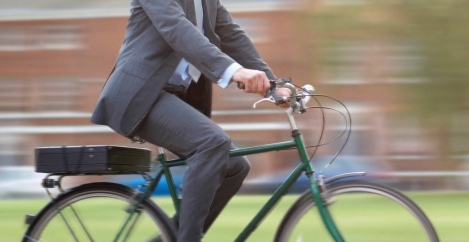June 5, 2022
Employers must do more to encourage active travel and cycling to work, says charity
 New research carried out by YouGov on behalf of Cycling UK claims that 43 percent of young people (18-24-year-olds) are considering changing their method of travel to include more public transport and cycling to work due to expected increases in transport costs. The findings are published as the reduction in disposable income forces households to tighten budgets and workers are forking out a greater proportion of their income simply to get to work.
New research carried out by YouGov on behalf of Cycling UK claims that 43 percent of young people (18-24-year-olds) are considering changing their method of travel to include more public transport and cycling to work due to expected increases in transport costs. The findings are published as the reduction in disposable income forces households to tighten budgets and workers are forking out a greater proportion of their income simply to get to work.
The report claims that 81 percent of respondents across all age groups are expecting their transport costs to increase over the next six months. Of these, 18-24-year-olds are the most likely to be considering alternatives (43 percent), including active travel.
Fuel price rises are likely to hit young people the hardest as they are entering the workforce, studying or training and are typically on lower incomes. ONS figures for 2021 show 18-21-year-olds in the UK had average (mean) earnings of £12,275 annually, and the 22-29 age group earned an average of £25,997 per annum. This is in contrast with £31,447, the average annual pay for the population as a whole.
According to Cycling UK, the new YouGov figures reflect young people’s concerns but there are measures that employers can take to mitigate the financial stress. When respondents who said they are not currently cycling to work were asked about specific changes that would encourage them to do so, 37 percent of young people (18-24) were more likely to do so if their workplace offered improved facilities, such as bike storage and lockers. Over a third of the same group (36 percent) also said they’d be more likely to cycle to work if their employer offered financial help to buy a bike, and 29 percent if their workplace offered a cycle to work scheme.
Sarah Mitchell, Cycling UK’s chief executive, says: “People should be considering cycling as a cost-effective way to commute shorter journeys. The upfront investment, even with e-cycles, soon pays for itself when you consider how much you are saving at the petrol pump.
“However, there are still lingering perceived barriers to cycling, and employers can play a key role in making it a realistic and practical option for their staff. It’s a win-win solution; companies can attract the best young talent while enjoying better staff retention and productivity. At the same time, it eases the financial burden on workers, who no longer need to pay to go to the gym yet will feel happier and healthier.”














